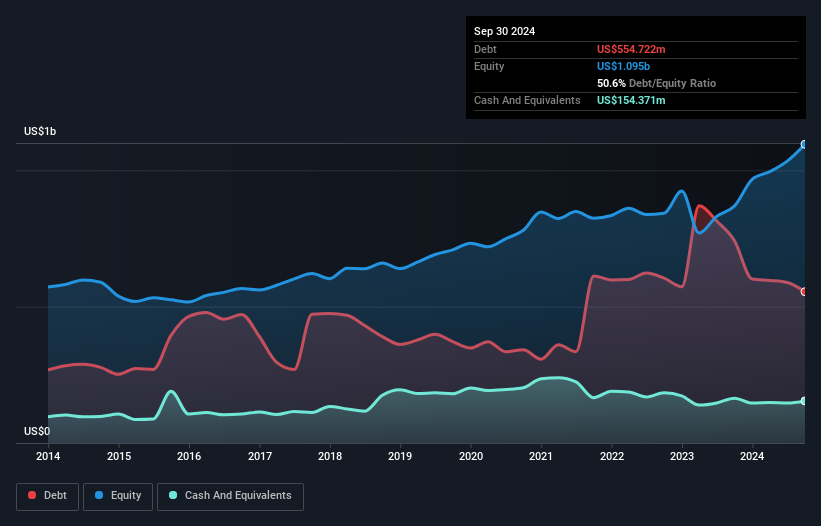- United States
- /
- Commercial Services
- /
- NYSE:MSA
Here's Why MSA Safety (NYSE:MSA) Can Manage Its Debt Responsibly
Warren Buffett famously said, 'Volatility is far from synonymous with risk.' So it might be obvious that you need to consider debt, when you think about how risky any given stock is, because too much debt can sink a company. We can see that MSA Safety Incorporated (NYSE:MSA) does use debt in its business. But should shareholders be worried about its use of debt?
When Is Debt A Problem?
Debt is a tool to help businesses grow, but if a business is incapable of paying off its lenders, then it exists at their mercy. Part and parcel of capitalism is the process of 'creative destruction' where failed businesses are mercilessly liquidated by their bankers. While that is not too common, we often do see indebted companies permanently diluting shareholders because lenders force them to raise capital at a distressed price. Having said that, the most common situation is where a company manages its debt reasonably well - and to its own advantage. When we examine debt levels, we first consider both cash and debt levels, together.
View our latest analysis for MSA Safety
How Much Debt Does MSA Safety Carry?
You can click the graphic below for the historical numbers, but it shows that MSA Safety had US$554.7m of debt in September 2024, down from US$742.0m, one year before. However, it does have US$154.4m in cash offsetting this, leading to net debt of about US$400.4m.

How Healthy Is MSA Safety's Balance Sheet?
The latest balance sheet data shows that MSA Safety had liabilities of US$314.5m due within a year, and liabilities of US$832.1m falling due after that. Offsetting this, it had US$154.4m in cash and US$277.3m in receivables that were due within 12 months. So its liabilities total US$714.9m more than the combination of its cash and short-term receivables.
Given MSA Safety has a market capitalization of US$6.99b, it's hard to believe these liabilities pose much threat. However, we do think it is worth keeping an eye on its balance sheet strength, as it may change over time.
We use two main ratios to inform us about debt levels relative to earnings. The first is net debt divided by earnings before interest, tax, depreciation, and amortization (EBITDA), while the second is how many times its earnings before interest and tax (EBIT) covers its interest expense (or its interest cover, for short). This way, we consider both the absolute quantum of the debt, as well as the interest rates paid on it.
MSA Safety has a low net debt to EBITDA ratio of only 0.84. And its EBIT covers its interest expense a whopping 13.4 times over. So you could argue it is no more threatened by its debt than an elephant is by a mouse. Fortunately, MSA Safety grew its EBIT by 7.6% in the last year, making that debt load look even more manageable. When analysing debt levels, the balance sheet is the obvious place to start. But ultimately the future profitability of the business will decide if MSA Safety can strengthen its balance sheet over time. So if you want to see what the professionals think, you might find this free report on analyst profit forecasts to be interesting.
Finally, a company can only pay off debt with cold hard cash, not accounting profits. So we always check how much of that EBIT is translated into free cash flow. In the last three years, MSA Safety's free cash flow amounted to 34% of its EBIT, less than we'd expect. That's not great, when it comes to paying down debt.
Our View
The good news is that MSA Safety's demonstrated ability to cover its interest expense with its EBIT delights us like a fluffy puppy does a toddler. But truth be told we feel its conversion of EBIT to free cash flow does undermine this impression a bit. All these things considered, it appears that MSA Safety can comfortably handle its current debt levels. Of course, while this leverage can enhance returns on equity, it does bring more risk, so it's worth keeping an eye on this one. Of course, we wouldn't say no to the extra confidence that we'd gain if we knew that MSA Safety insiders have been buying shares: if you're on the same wavelength, you can find out if insiders are buying by clicking this link.
When all is said and done, sometimes its easier to focus on companies that don't even need debt. Readers can access a list of growth stocks with zero net debt 100% free, right now.
New: Manage All Your Stock Portfolios in One Place
We've created the ultimate portfolio companion for stock investors, and it's free.
• Connect an unlimited number of Portfolios and see your total in one currency
• Be alerted to new Warning Signs or Risks via email or mobile
• Track the Fair Value of your stocks
Have feedback on this article? Concerned about the content? Get in touch with us directly. Alternatively, email editorial-team (at) simplywallst.com.
This article by Simply Wall St is general in nature. We provide commentary based on historical data and analyst forecasts only using an unbiased methodology and our articles are not intended to be financial advice. It does not constitute a recommendation to buy or sell any stock, and does not take account of your objectives, or your financial situation. We aim to bring you long-term focused analysis driven by fundamental data. Note that our analysis may not factor in the latest price-sensitive company announcements or qualitative material. Simply Wall St has no position in any stocks mentioned.
About NYSE:MSA
MSA Safety
Develops, manufactures, and supplies safety products and technology solutions that protect people and facility infrastructures worldwide.
Undervalued with proven track record and pays a dividend.
Similar Companies
Market Insights
Community Narratives



